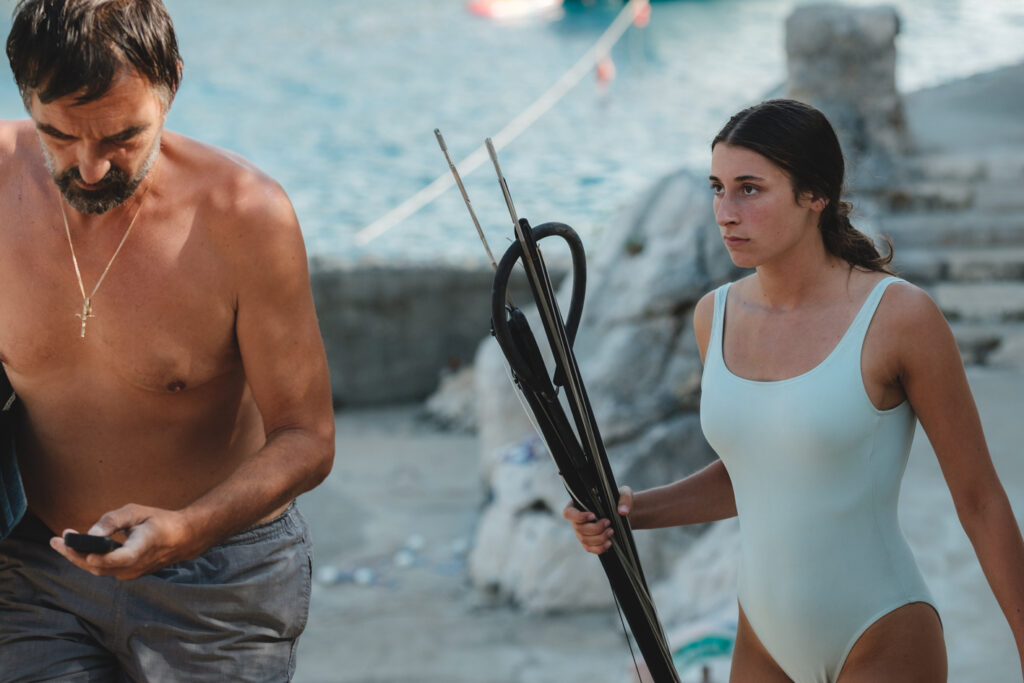Antoneta Alamat Kusijanovic is a writer-director born in Dubrovnik and currently based in New York. Her short “Into the Blue” was nominated for a Student Academy Award, and won awards at the Berlin International Film Festival, Sarajevo Film Festival, Oberhausen Film Festival, and the Festival de Premier Plans, Angers, among many others. She is an alumna of the Berlinale Talent Lab, Sarajevo Talent Lab, La Femis Producing Atelier, and the Marcie Bloom Fellowship, and is a member of the Academy.
“Murina” is screening in Directors’ Fortnight at the 2021 Cannes Film Festival. The fest is taking place July 6-17.
W&H: Describe the film for us in your own words.
AAK: “Murina” is sensual and violent, the adults are coming of age, and a teenage girl between them is struggling to find a savior, an anchor among them.
W&H: What drew you to this story?
AAK: It was important for me to portray both the [evolution] and the constraints we experience while growing into ourselves — that is “Murina” for me. It is path of birthing yourself. It is going through the storm, and through deep underwater tunnels.
W&H: What do you want people to think about after they watch the film?
AAK: The resilience, power, and hope we all have as our younger selves — something that degenerates over the years. I wish to bring people to that emotional place to reclaim it. I would like them to regain that childlike faith of the unknown, the omnipotent nature, or some might call it the divine.
W&H: What was the biggest challenge in making the film?
AAK: It’s the same as in marriage: it’s picking the partners and the subjects you will be married to for a long time. I always like to write myself a letter early on to look at months into the production when it gets hard, to be reminded and get that initial love and passion I had at the start.
W&H: How did you get your film funded? Share some insights into how you got the film made.
AAK: Finding money for any project is difficult, especially when it is a personal independent film; it is asking people to be able to see your dreams and trust everyone will respond to it. I have been lucky to have the Croatian Audiovisual center that funds filmmakers, the benefit of the European system, and producers who were willing to take a risk and invest their money into “Murina.”
W&H: What inspired you to become a filmmaker?
AAK: Growing up in Dubrovnik, on the streets of the ancient city, among kids, totally free, to play from morning to night, we always directed. It was the most imaginative time of my life. I think I started directing as early as four years old.
W&H: What’s the best and worst advice you’ve received?
AAK: Both the best and worst advice I have ever received is to be humble.
W&H: What advice do you have for other women directors?
AAK: Never do anything that is not important in the face of death. That is my advice to any director.
W&H: Name your favorite woman-directed film and why.
AAK: My favorite film is “The Piano,” directed by Jane Campion. It is sensual, delicate, and powerful. The film portrays a woman in so many layers, [exploring her relationship to] men, art, and motherhood.
W&H: How are you adjusting to life during the COVID-19 pandemic? Are you keeping creative, and if so, how?
AAK: During COVID I have been pregnant, which is the biggest creation of all. That made both shooting and travel for work more complicated. Patience, a positive attitude, and perseverance helped.
W&H: The film industry has a long history of underrepresenting people of color onscreen and behind the scenes and reinforcing — and creating — negative stereotypes. What actions do you think need to be taken to make it more inclusive?
AAK: The most important action that needs to be taken is funding underrepresented people. It is essential to financially support them.







